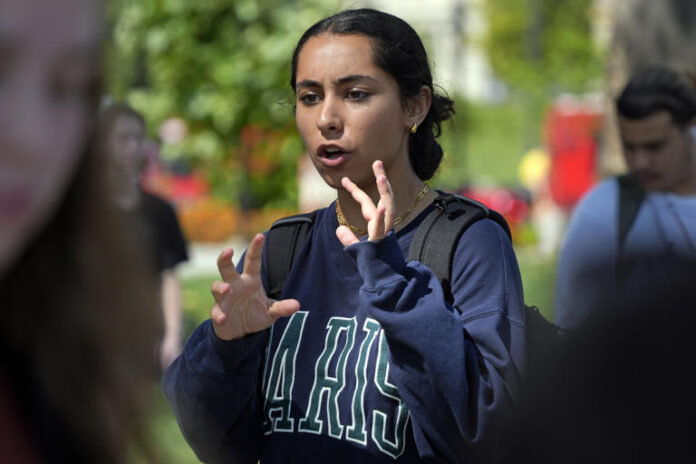
PITTSBURGH— At the University of Pittsburgh, as freshmen students took their first steps on campus and swarms of lanternflies buzzed through the air, the sounds of Taylor Swift and Chappell Roan drifted from a folding table draped with an iridescent pink tablecloth.
Fruit snacks and colorful butterfly hairclips were laid out next to pink stickers that said “Saving Democracy is Hot” and “Hot Peeps Vote.” The organizers wore shirts that said “Hot Girls Vote.»
The voter registration drive was run by NextGen America, a progressive organization that’s trying to increase turnout among young women in battleground states such as Pennsylvania.
Meredith Wenthur, who recently moved from North Carolina to Pittsburgh to start college, stopped by the table to register and said she plans to vote for Democrat Kamala Harris. She was thrilled by the vice president’s performance in the debate with Republican Donald Trump, saying it was “really something» to see a woman assert herself like that against a man.
While young women have leaned more Democratic than Republican, this year’s election could see a historic gender gap as Harris tries to become the country’s first female president and the fight over abortion rights remains an animating issue.
“Men shouldn’t have a say in what women can and can’t do with their bodies,” said Wenthur, 18.
And in Allegheny County — which has voted for a Democratic president in the past five election cycles — turnout of young women will be crucial in the country’s largest battleground state. As of Oct. 21, the county has registered more than 88,670 18- to 24-year-olds this election cycle, and more than 183,232 25- to 34-year-olds, according to state data. Combined they represent almost 30% of the county’s voting population of more than 943,221 registered voters.
There are 522,536 registered Democrats and 270,952 registered Republicans.
Getting this traditionally Democratic group to the polls will be crucial for Harris, since surrounding, more rural, Republican counties could deliver a victory for former President Trump.
Young women are politically activated on campus
Trump is trying to galvanize young men who are disoriented by these gender shifts, frequently emphasizing his masculinity in campaign speeches and imagery. In recent speeches, Trump has added a refrain about how women must be sheltered from the world and casting himself as their “protector.”
“They will finally be healthy, hopeful, safe and secure,” he says. “Their lives will be happy, beautiful and great again.”
Harris, in turn, says Republicans are “simply out of their mind.”
“It’s clear that they just don’t trust women,” she says on the campaign trail. “Well, we trust women.”
Jessica Herrera, a senior director at Supermajority, a liberal organization focused on mobilizing young women, said abortion is a potent issue because it’s a symbol of autonomy.
“When candidates and politicians talk about abortion, it isn’t the procedure itself,” she said. “It’s the power that we have to make decisions about our own lives.”
Supermajority’s research focuses on young women who are infrequent voters or don’t vote, and Herrera thinks Harris is poised to expand the electorate.
“If we see a surge this year, it’s going to be young women voters,» she said. «They have come around in a way that I think is surprising.”
Celinda Lake, a Democratic pollster, said Trump’s message is off-putting for women.
“Women want to be empowered. Women want to have freedom. Women want to have control,» she said. «He talks about protection. He talks about him being in control.”
Karoline Leavitt, Trump’s national press secretary, said while Harris could potentially become the first female president, “she has implemented dangerously liberal policies that have left women worse off financially and far less safe than we were four years ago under President Trump.”
The stakes are high in Pennsylvania
Allegheny County, with a population of 1.25 million people, is a blue tile in an otherwise red patchwork of surrounding counties.
President Joe Biden won the state by a little more than a percentage point four years ago. Hillary Clinton lost it by an even slimmer margin four years before that.
In this election cycle, Pennsylvania has generated the most attention by far from both candidates. As of Oct. 22nd, they will have made 50 stops in the state, according to Associated Press tracking of the campaigns’ public events.
Chris Borick, a professor of political science at Muhlenberg College in Allentown, said enthusiasm among young women for Harris could help put her over the top.
“This is one of those places where you could see something really different,” he said.
Still, some women aren’t convinced, even with the tens of millions of dollars each candidate has invested in the state.
Teba Latef, an 18-year-old Pittsburgh freshman studying neuroscience, said she’s undecided and feels like Trump and Harris don’t speak with nuance about important issues.
“They take advantage of different kinds of people,” she said, “Trump takes advantage of men who feel like they’re being left behind and Harris is manipulating women who are concerned about their reproductive rights, knowing that realistically bringing the nationwide right to abortion back is nearly impossible.”





